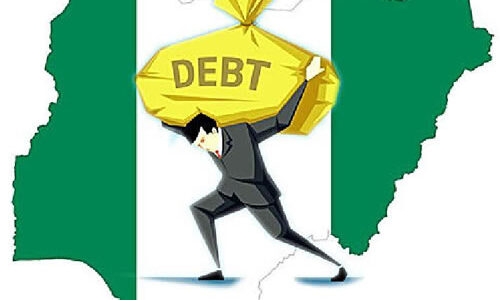
With Nigeria facing a mounting debt burden, a report released by Cowry Asset Management Limited, yesterday, revealed that the country’s external debt profile by credit institutions now sits at $42 billion, adding to growing concerns about its potential implications for financial stability and economy.
Similarly, the report indicated that the country’s inflation rate may reach 35.20% in December 2024, up from 34.60% recorded in November.

According to the Chief Executive Officer, Cowry Asset Management Limited, Johnson Chukwu, this persistent inflationary trend is partly driven by the government’s deficit spending and pressure on food prices which has been significant concerns for the ecoThe 2025 budget, presented by President Tinubu, includes a projected deficit of N13.08 trillion, approximately 3.89% of GDP.
However, this substantial deficit is likely to contribute to inflationary pressures this year, Chukwu stated while adding that the FG’s continued reliance on deficit spending to fund its activities injects additional liquidity into the economy, thereby counteracting the Central Bank of Nigeria’s (CBN) efforts to control inflation through monetary tightening. Also, with the latest data by Debt Management Office (DMO) revealing the country’s total public debt amassing about N134.3 trillion and an estimated N42 trillion in terms of national debt from both domestic and external sources in 2024, Nigeria’s debt-to-GDP could approximately rise by 58.3% from an estimated 40.1% in 2023.

Delivering a presentation titled; Nigeria’s macroeconomic and sectoral outlook in 2025: Looking Beyond the Rhetorics via Zoom on Wednesday, Chukwu noted that this surpasses the 55% sustainable median threshold set by the World Bank for low income countries.
“Our external debt is not a threat to the economy yet but debt service is a problem and this is why we must bear that in mind while we are borrowing further because the amount spent in servicing debt is eating up whatever is available to sectoral investments”, he said.
Speaking further, Chukwu noted that whilst the government plans to cover the budget deficit by raising funds from the domestic economy (N7.3 trillion), International borrowing (N1.8 trillion) and multilateral agencies (3.8 trillion) and N15 trillion on servicing its debt, that is approximately one-third of the projected revenue (N34.82 trillion), suggesting that the government may indeed spend more on debt servicing than it generates in revenue this year.
He maintained that FG’s continued reliance on Ways and Means Advances from the CBN to finance its deficit is a key factor of the soaring inflation while adding that despite the CBN’s decision to maintain the Ways and Means Advances limit at 5% for 2024-2025, the large amounts previously borrowed under this facility have indeed contributed to increased money circulation and high inflation rates.
“The truth is that the FG has continued to borrow to fund its activities in 2024. According to data from the CBN, total government revenue cumulatively stood at N6.8 trillion while total government expenditure for the same period was N19.61 trillion and so if you consider that the government spent N19.61 trillion as at October 2024 and generated about N6.82 trillion, it then means that government in the first 10 months of the year, recorded a deficit of about N12.8 trillion. Bear in mind that as at 2023, the government recorded a deficit of about N10 trillion.
The implication of this is that the pressures we have on inflation is partly driven by these deficits because the government is spending more it is generating so it is pumping a lot of liquidity into the economy which is coming from Ways and Means funding”, he explained.
Credit: The Sun
